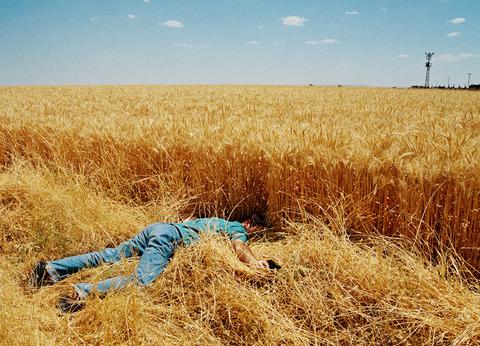当前位置:
X-MOL 学术
›
Trans. Instit. Br. Geogr.
›
论文详情
Our official English website, www.x-mol.net, welcomes your
feedback! (Note: you will need to create a separate account there.)
Contemporary art and the geopolitics of extractivism in Turkey's Kurdistan
Transactions of the Institute of British Geographers ( IF 3.3 ) Pub Date : 2021-05-04 , DOI: 10.1111/tran.12465 Eray Çaylı 1
Transactions of the Institute of British Geographers ( IF 3.3 ) Pub Date : 2021-05-04 , DOI: 10.1111/tran.12465 Eray Çaylı 1
Affiliation

|
Discussing a body of artwork made in Turkey's Kurdistan, I explore contemporary art's potential to facilitate critical insight into the (geo)politics of ecology today. A significant strand of the growing geographical literature on art's critical potential focuses on issues of ecological import such as climate change, locating critique in problematisation of Eurocentric aesthetics for its links with colonialism and racialised humanism. Still another strand focuses on neoliberal geopolitics, appraising contemporary art's critical potential against post-political approaches to democracy, peace, and prosperity. I bring together these two strands, both methodologically and empirically, as I consider the politics of ecology in Turkey's Kurdistan, inextricably intertwined with both state-endorsed racial violence in the 20th century and neoliberal democratisation and peace-making in the 21st century. Methodologically, I develop and operationalise the concept of extractivism in conversation with recent critics of the Anthropocene thesis who foreground racial capitalism rather than humanity as the geopolitical – geological and geographical – force afflicting ecology. Empirically, I draw on the artworks under discussion to unpack how extractivism in Turkey's Kurdistan has not only continued unabated throughout the neoliberal-democratic transition from “war” to “peace” but has also structured the latter paradigm on the former, influencing realms beyond resource extraction. The resulting argument is the following. Challenging the Eurocentrism of aesthetics and/or the neoliberal post-political paradigm remain important indicators of art's critical (geo)political potential. However, a fuller appraisal of this potential also requires asking if and to what extent such challenges redistribute agency vis-à-vis power relations formed by and formative of extractivism as a set of racialised practices operating not only through industries of extraction proper, like mining, agriculture, and construction, but also through cultural ones like art.
中文翻译:

土耳其库尔德斯坦的当代艺术与采掘主义的地缘政治
通过讨论土耳其库尔德斯坦制作的一系列艺术品,我探索了当代艺术在促进对当今生态(地缘)政治的批判性洞察方面的潜力。关于艺术批判潜力的日益增长的地理文献中的一个重要分支集中在生态重要性问题上,例如气候变化,将批评定位于欧洲中心美学与殖民主义和种族化人文主义的联系的问题化。还有一个分支专注于新自由主义地缘政治,评估当代艺术在民主、和平与繁荣的后政治方法中的关键潜力。当我考虑土耳其库尔德斯坦的生态政治时,我在方法论和经验上将这两条线结合在一起,与 20 世纪国家认可的种族暴力和 21 世纪的新自由主义民主化与缔造和平密不可分。在方法论上,我在与最近对人类世论点的批评者的对话中发展并实施了采掘主义的概念,他们将种族资本主义而不是人类视为地缘政治——地质和地理——影响生态的力量。凭经验,我利用讨论中的艺术作品来揭示土耳其库尔德斯坦的采掘主义如何不仅在新自由主义民主从“战争”到“和平”的过渡过程中持续有增无减,而且还在前者的基础上构建了后者的范式,影响了资源以外的领域萃取。结果论证如下。挑战美学的欧洲中心主义和/或新自由主义的后政治范式仍然是艺术批判(地缘)政治潜力的重要指标。然而,对这种潜力的更全面评估还需要询问这些挑战是否以及在多大程度上重新分配了权力关系,即采掘主义所形成和形成的权力关系,作为一套不仅通过采矿业等采掘业运作的种族化实践,农业和建筑,还包括艺术等文化。
更新日期:2021-05-04
中文翻译:

土耳其库尔德斯坦的当代艺术与采掘主义的地缘政治
通过讨论土耳其库尔德斯坦制作的一系列艺术品,我探索了当代艺术在促进对当今生态(地缘)政治的批判性洞察方面的潜力。关于艺术批判潜力的日益增长的地理文献中的一个重要分支集中在生态重要性问题上,例如气候变化,将批评定位于欧洲中心美学与殖民主义和种族化人文主义的联系的问题化。还有一个分支专注于新自由主义地缘政治,评估当代艺术在民主、和平与繁荣的后政治方法中的关键潜力。当我考虑土耳其库尔德斯坦的生态政治时,我在方法论和经验上将这两条线结合在一起,与 20 世纪国家认可的种族暴力和 21 世纪的新自由主义民主化与缔造和平密不可分。在方法论上,我在与最近对人类世论点的批评者的对话中发展并实施了采掘主义的概念,他们将种族资本主义而不是人类视为地缘政治——地质和地理——影响生态的力量。凭经验,我利用讨论中的艺术作品来揭示土耳其库尔德斯坦的采掘主义如何不仅在新自由主义民主从“战争”到“和平”的过渡过程中持续有增无减,而且还在前者的基础上构建了后者的范式,影响了资源以外的领域萃取。结果论证如下。挑战美学的欧洲中心主义和/或新自由主义的后政治范式仍然是艺术批判(地缘)政治潜力的重要指标。然而,对这种潜力的更全面评估还需要询问这些挑战是否以及在多大程度上重新分配了权力关系,即采掘主义所形成和形成的权力关系,作为一套不仅通过采矿业等采掘业运作的种族化实践,农业和建筑,还包括艺术等文化。









































 京公网安备 11010802027423号
京公网安备 11010802027423号